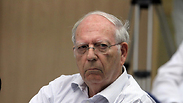
Stones thrown at Light Rail. 'Let's not wait for the moment IDF has to defend Jerusalem's streets'
Photo: Gil Yohanan

Former Mossad chief Efraim Halevy
Photo: Gil Yohanan
"From a religious point of view, there is nothing wrong with negotiating with the occupation force. Just like we negotiate with weapons, we can negotiate with words. Our policy is that there should be no negotiations with Israel, but the others must know that this is not forbidden."
The Hamas leadership in Cairo responded by saying that "direct negotiations with the occupation are not part of the movement's policy and are not on the agenda."
This statement was made a week ago by Mousa Abu Marzook, Hamas' deputy politburo chief who was the organization's senior representative to the Cairo talks, which led to the declaration of a ceasefire between Israel and Hamas.
Growing Violence
Noam (Dabul) Dvir
Ramat Gan family recovering from near lynch attempt after Arabs threw rocks, bricks at their car when they took a wrong turn on the way to a Golani swearing-in ceremony in Jerusalem.
Abu Marzook's statement removes the religious-Islamic aspect from Hamas' variety of considerations, and at the same time invalidates the place of Muslim clerics at the negotiating table and decision making circle.
There is nothing new here. For years, Khaled Mashal has been making it clear to his interlocutors, including from the United States, that the Hamas leadership is political and makes its decisions based on strategic and political considerations. Hamas, on its part, is not waging a religious war against Israel, but an aggressive and political battle.
It should be noted that Marzook's statement mentions Israel explicitly. The sentence "just like we negotiate with weapons, we can negotiate with words" is reminiscent of German strategist Carl von Clausewitz's statement that "war is a continuation of political intercourse, a carrying out of the same by other means."
Abu Marzook added an internal Gazan aspect to his considerations, stating that "if the situation remains unchanged under the current circumstances, and I am saying this frankly, the Hamas movement will be forced to take this path (negotiating with Israel), because this has become a popular demand in all of the Gaza Strip."
There is no stronger evidence of Hamas' understanding that the public opinion in the Strip is a highly significant factor that the organization must consider when it forms its operational decisions. The destruction sights weigh highly on the formation of the current state of affairs on Gaza's streets.
What do we do with this bundle of political tools, which have fallen into our hands too? Israel's considerations should not be narrowed down to discussions aimed at drawing lessons and preparing the defense establishment for the next round of fighting. Israel must deeply analyze the meaning of the growing support for Hamas in Judea and Samaria.
More than 10 years have passed since Operation Defensive Shield, which allegedly crushed the "resistance to the occupation" in the West Bank, and Hamas is still gaining public support in the West Bank despite the loathing of the Palestinian Authority and Fatah movement leaders.
Many successful operations by the security forces against the terror cells, a complete destruction of Hamas' social and economic systems and the arrest of activists have failed to prevent extremely painful action against Israeli citizens.
The "lawnmowers" of Israel and the Palestinian Authority are working incessantly, but the grass is growing back quickly. Operation Defensive Shield did not send Hamas into the dustbin of history. The security situation in some of Jerusalem's Jewish neighborhoods is getting worse despite the increasing efforts made by the Israel Police officers, who are demonstrating remarkable demonstration. Ask the French Hill residents.
What we need at this time is a realistic-strategic assessment of the situation, binding the Gazan challenge with the growing challenge on the streets of Jerusalem and in Judea and Samaria. We need discussions which will reveal the political-strategic picture in its full width and depth both in Judea and Samaria and in Gaza. The intelligence and defense systems must present the current state of affairs and the security and political alternatives.
This must be done here and now, without waiting for the moment the IDF is required to defend Jerusalem's streets.
Efraim Halevy is a former head of the Mossad.















